Psychosocial Development: Erikson and Bronfenbrenner Theories
VerifiedAdded on 2022/11/01
|7
|1873
|476
Essay
AI Summary
This essay delves into the realm of psychosocial development, primarily focusing on the theories of Erik Erikson and Urie Bronfenbrenner. It examines Erikson's stages of psychosocial development, particularly the 'muscular-anal' stage (ages 2-5), emphasizing the importance of toilet training, cleanliness, and the development of autonomy versus shame and doubt. The essay highlights the impact of both normative and non-normative events on a child's development, illustrating how supportive environments, such as the one provided by Tom, the father, can foster independence and confidence. Furthermore, it integrates Bronfenbrenner's bioecological theory, stressing the influence of the microsystem (home, playground, neighborhood) on a child's interactions and development. The essay analyzes a case study of a child, Andrew, and his family to demonstrate the practical application of these theories, emphasizing the crucial role of parents, caregivers, and the broader community in supporting a child's healthy psychosocial growth. The essay also discusses the significance of these theories in nursing care, including the ability to identify developmental delays and provide appropriate guidance to parents.
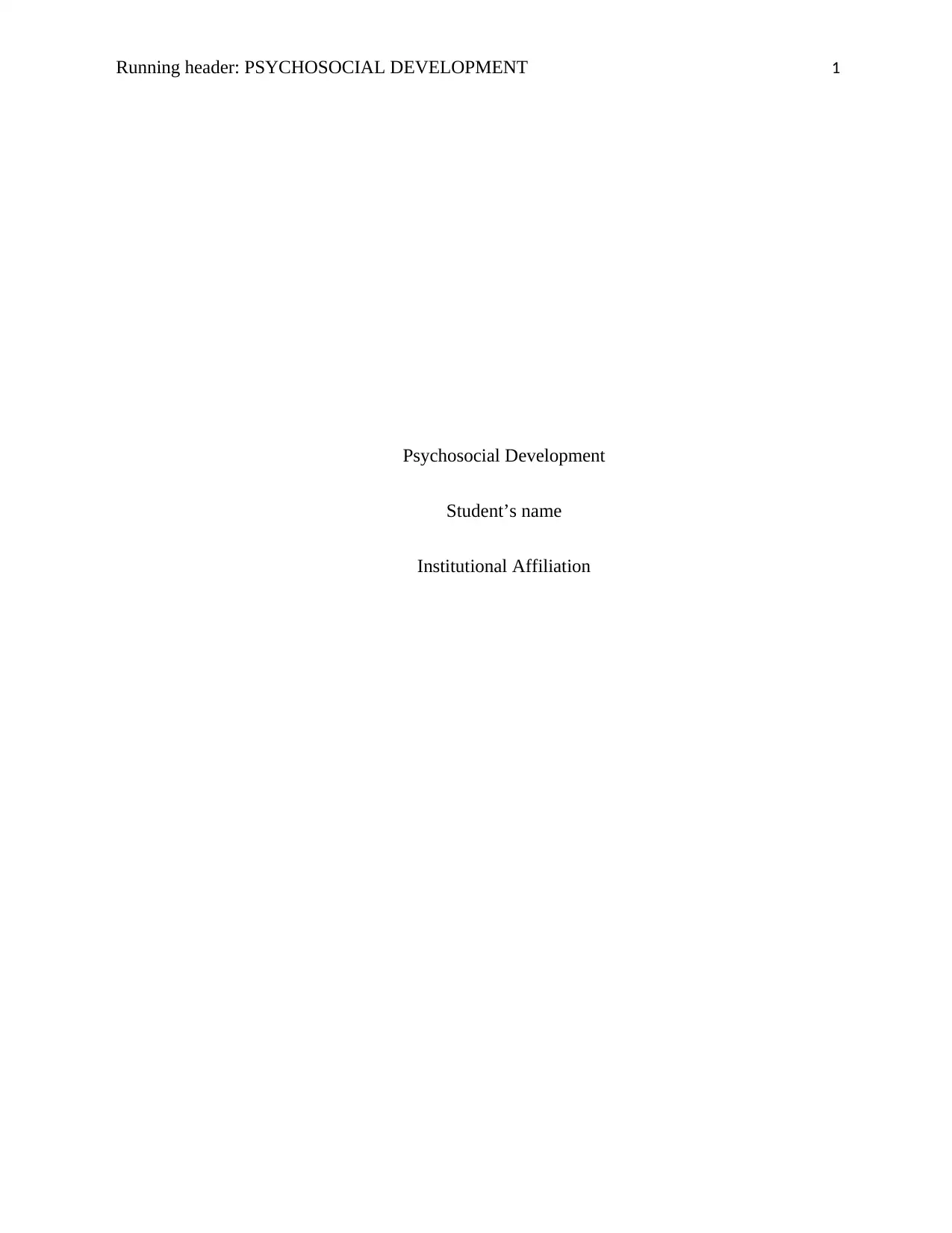
Running header: PSYCHOSOCIAL DEVELOPMENT 1
Psychosocial Development
Student’s name
Institutional Affiliation
Psychosocial Development
Student’s name
Institutional Affiliation
Paraphrase This Document
Need a fresh take? Get an instant paraphrase of this document with our AI Paraphraser
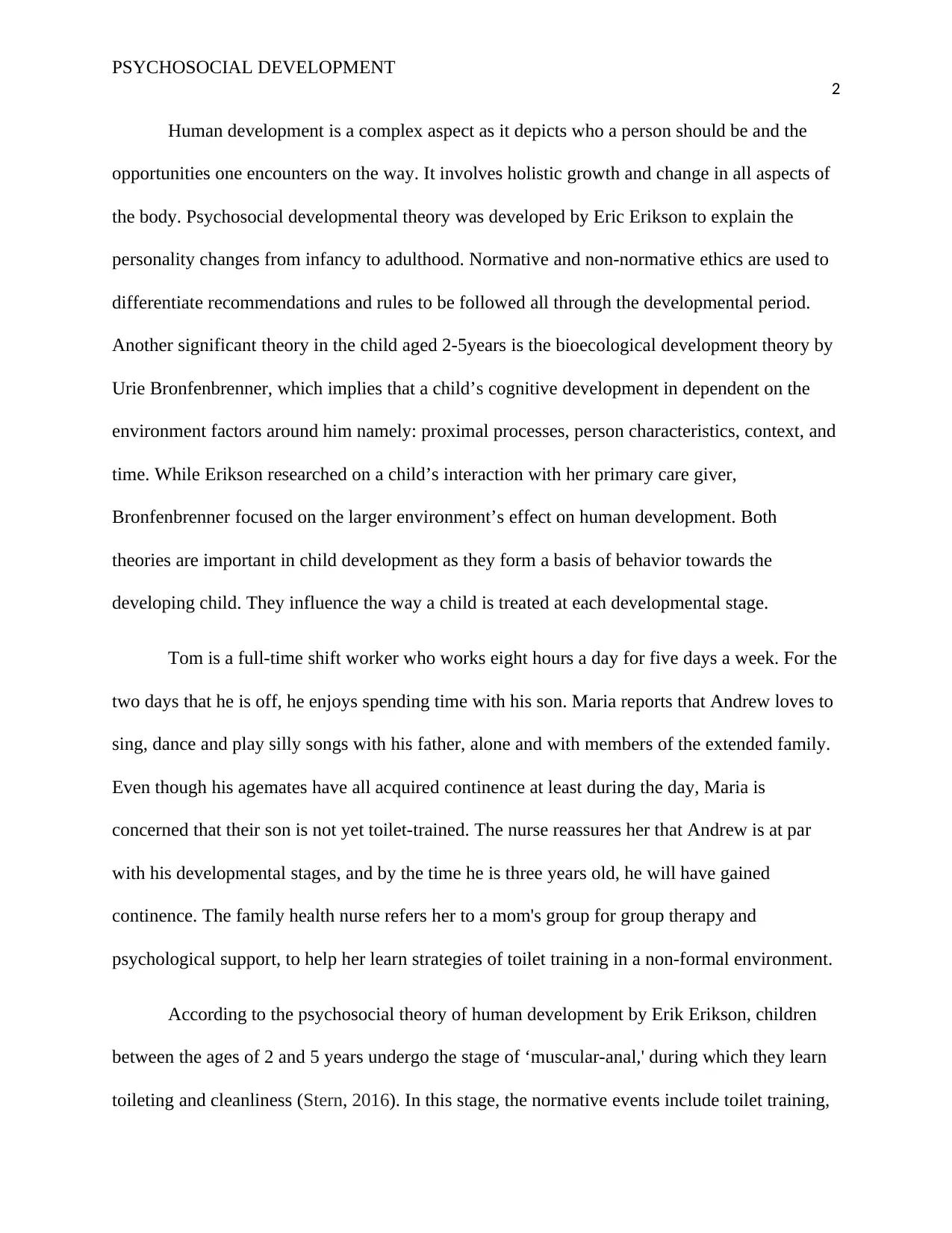
PSYCHOSOCIAL DEVELOPMENT
2
Human development is a complex aspect as it depicts who a person should be and the
opportunities one encounters on the way. It involves holistic growth and change in all aspects of
the body. Psychosocial developmental theory was developed by Eric Erikson to explain the
personality changes from infancy to adulthood. Normative and non-normative ethics are used to
differentiate recommendations and rules to be followed all through the developmental period.
Another significant theory in the child aged 2-5years is the bioecological development theory by
Urie Bronfenbrenner, which implies that a child’s cognitive development in dependent on the
environment factors around him namely: proximal processes, person characteristics, context, and
time. While Erikson researched on a child’s interaction with her primary care giver,
Bronfenbrenner focused on the larger environment’s effect on human development. Both
theories are important in child development as they form a basis of behavior towards the
developing child. They influence the way a child is treated at each developmental stage.
Tom is a full-time shift worker who works eight hours a day for five days a week. For the
two days that he is off, he enjoys spending time with his son. Maria reports that Andrew loves to
sing, dance and play silly songs with his father, alone and with members of the extended family.
Even though his agemates have all acquired continence at least during the day, Maria is
concerned that their son is not yet toilet-trained. The nurse reassures her that Andrew is at par
with his developmental stages, and by the time he is three years old, he will have gained
continence. The family health nurse refers her to a mom's group for group therapy and
psychological support, to help her learn strategies of toilet training in a non-formal environment.
According to the psychosocial theory of human development by Erik Erikson, children
between the ages of 2 and 5 years undergo the stage of ‘muscular-anal,' during which they learn
toileting and cleanliness (Stern, 2016). In this stage, the normative events include toilet training,
2
Human development is a complex aspect as it depicts who a person should be and the
opportunities one encounters on the way. It involves holistic growth and change in all aspects of
the body. Psychosocial developmental theory was developed by Eric Erikson to explain the
personality changes from infancy to adulthood. Normative and non-normative ethics are used to
differentiate recommendations and rules to be followed all through the developmental period.
Another significant theory in the child aged 2-5years is the bioecological development theory by
Urie Bronfenbrenner, which implies that a child’s cognitive development in dependent on the
environment factors around him namely: proximal processes, person characteristics, context, and
time. While Erikson researched on a child’s interaction with her primary care giver,
Bronfenbrenner focused on the larger environment’s effect on human development. Both
theories are important in child development as they form a basis of behavior towards the
developing child. They influence the way a child is treated at each developmental stage.
Tom is a full-time shift worker who works eight hours a day for five days a week. For the
two days that he is off, he enjoys spending time with his son. Maria reports that Andrew loves to
sing, dance and play silly songs with his father, alone and with members of the extended family.
Even though his agemates have all acquired continence at least during the day, Maria is
concerned that their son is not yet toilet-trained. The nurse reassures her that Andrew is at par
with his developmental stages, and by the time he is three years old, he will have gained
continence. The family health nurse refers her to a mom's group for group therapy and
psychological support, to help her learn strategies of toilet training in a non-formal environment.
According to the psychosocial theory of human development by Erik Erikson, children
between the ages of 2 and 5 years undergo the stage of ‘muscular-anal,' during which they learn
toileting and cleanliness (Stern, 2016). In this stage, the normative events include toilet training,
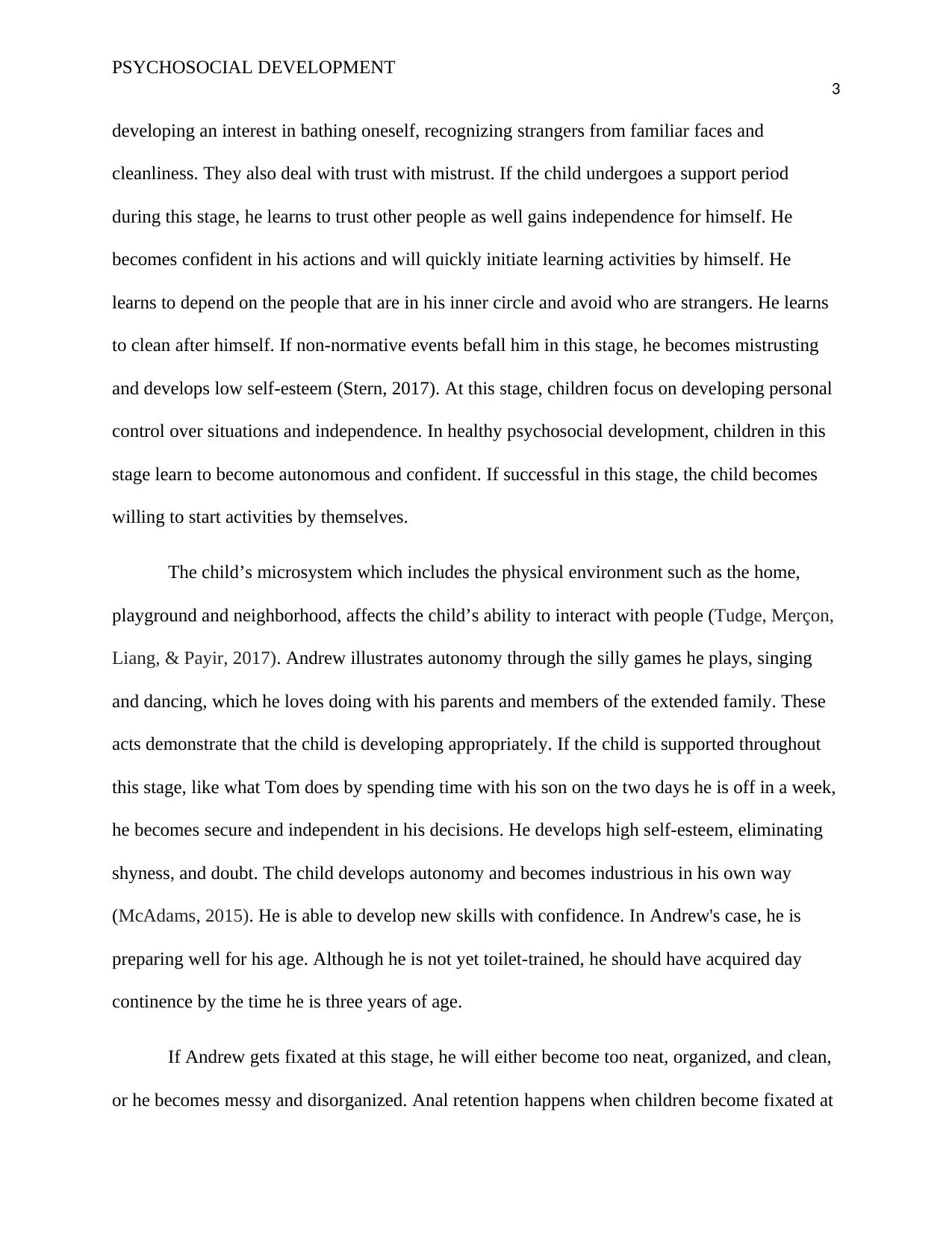
PSYCHOSOCIAL DEVELOPMENT
3
developing an interest in bathing oneself, recognizing strangers from familiar faces and
cleanliness. They also deal with trust with mistrust. If the child undergoes a support period
during this stage, he learns to trust other people as well gains independence for himself. He
becomes confident in his actions and will quickly initiate learning activities by himself. He
learns to depend on the people that are in his inner circle and avoid who are strangers. He learns
to clean after himself. If non-normative events befall him in this stage, he becomes mistrusting
and develops low self-esteem (Stern, 2017). At this stage, children focus on developing personal
control over situations and independence. In healthy psychosocial development, children in this
stage learn to become autonomous and confident. If successful in this stage, the child becomes
willing to start activities by themselves.
The child’s microsystem which includes the physical environment such as the home,
playground and neighborhood, affects the child’s ability to interact with people (Tudge, Merçon,
Liang, & Payir, 2017). Andrew illustrates autonomy through the silly games he plays, singing
and dancing, which he loves doing with his parents and members of the extended family. These
acts demonstrate that the child is developing appropriately. If the child is supported throughout
this stage, like what Tom does by spending time with his son on the two days he is off in a week,
he becomes secure and independent in his decisions. He develops high self-esteem, eliminating
shyness, and doubt. The child develops autonomy and becomes industrious in his own way
(McAdams, 2015). He is able to develop new skills with confidence. In Andrew's case, he is
preparing well for his age. Although he is not yet toilet-trained, he should have acquired day
continence by the time he is three years of age.
If Andrew gets fixated at this stage, he will either become too neat, organized, and clean,
or he becomes messy and disorganized. Anal retention happens when children become fixated at
3
developing an interest in bathing oneself, recognizing strangers from familiar faces and
cleanliness. They also deal with trust with mistrust. If the child undergoes a support period
during this stage, he learns to trust other people as well gains independence for himself. He
becomes confident in his actions and will quickly initiate learning activities by himself. He
learns to depend on the people that are in his inner circle and avoid who are strangers. He learns
to clean after himself. If non-normative events befall him in this stage, he becomes mistrusting
and develops low self-esteem (Stern, 2017). At this stage, children focus on developing personal
control over situations and independence. In healthy psychosocial development, children in this
stage learn to become autonomous and confident. If successful in this stage, the child becomes
willing to start activities by themselves.
The child’s microsystem which includes the physical environment such as the home,
playground and neighborhood, affects the child’s ability to interact with people (Tudge, Merçon,
Liang, & Payir, 2017). Andrew illustrates autonomy through the silly games he plays, singing
and dancing, which he loves doing with his parents and members of the extended family. These
acts demonstrate that the child is developing appropriately. If the child is supported throughout
this stage, like what Tom does by spending time with his son on the two days he is off in a week,
he becomes secure and independent in his decisions. He develops high self-esteem, eliminating
shyness, and doubt. The child develops autonomy and becomes industrious in his own way
(McAdams, 2015). He is able to develop new skills with confidence. In Andrew's case, he is
preparing well for his age. Although he is not yet toilet-trained, he should have acquired day
continence by the time he is three years of age.
If Andrew gets fixated at this stage, he will either become too neat, organized, and clean,
or he becomes messy and disorganized. Anal retention happens when children become fixated at
⊘ This is a preview!⊘
Do you want full access?
Subscribe today to unlock all pages.

Trusted by 1+ million students worldwide
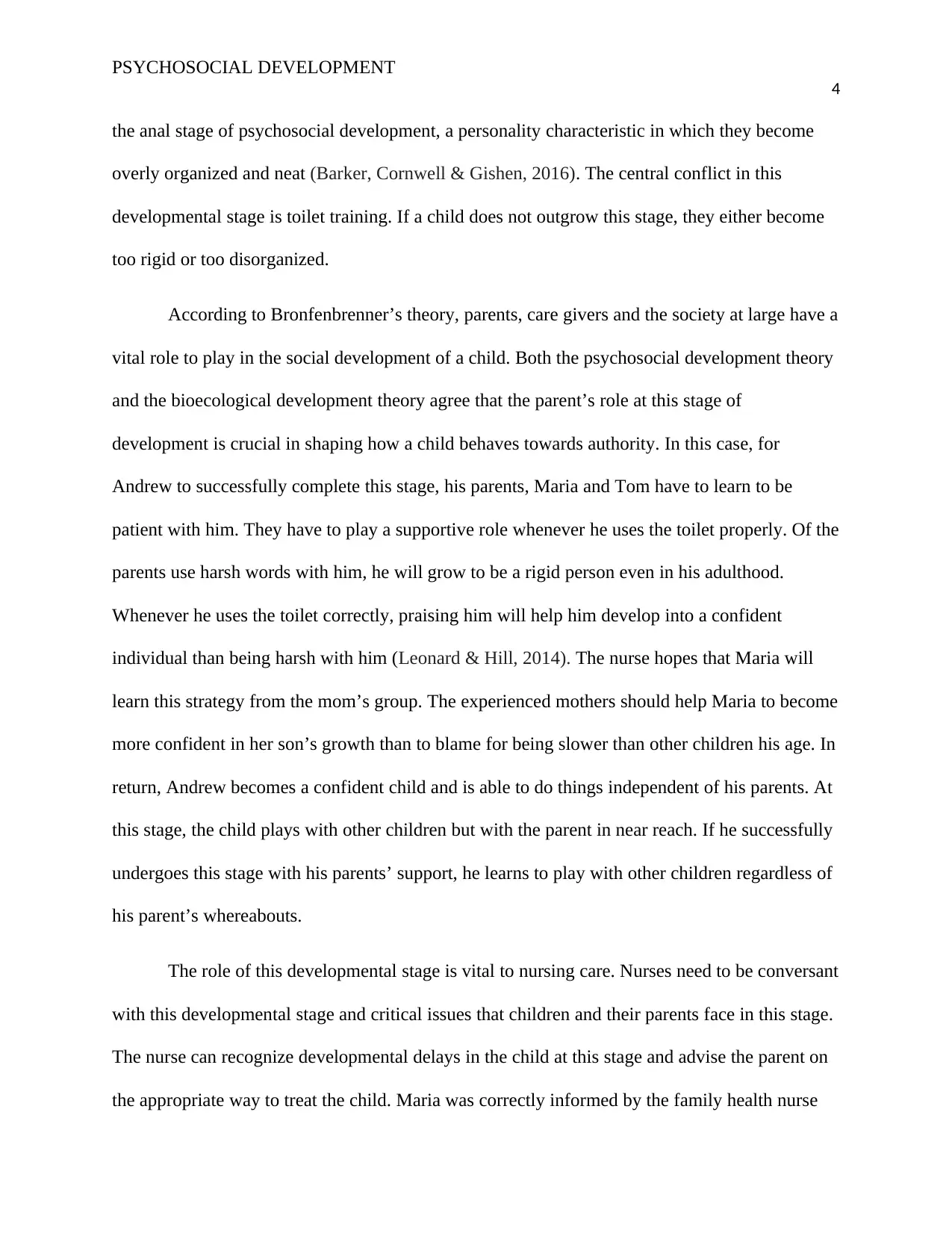
PSYCHOSOCIAL DEVELOPMENT
4
the anal stage of psychosocial development, a personality characteristic in which they become
overly organized and neat (Barker, Cornwell & Gishen, 2016). The central conflict in this
developmental stage is toilet training. If a child does not outgrow this stage, they either become
too rigid or too disorganized.
According to Bronfenbrenner’s theory, parents, care givers and the society at large have a
vital role to play in the social development of a child. Both the psychosocial development theory
and the bioecological development theory agree that the parent’s role at this stage of
development is crucial in shaping how a child behaves towards authority. In this case, for
Andrew to successfully complete this stage, his parents, Maria and Tom have to learn to be
patient with him. They have to play a supportive role whenever he uses the toilet properly. Of the
parents use harsh words with him, he will grow to be a rigid person even in his adulthood.
Whenever he uses the toilet correctly, praising him will help him develop into a confident
individual than being harsh with him (Leonard & Hill, 2014). The nurse hopes that Maria will
learn this strategy from the mom’s group. The experienced mothers should help Maria to become
more confident in her son’s growth than to blame for being slower than other children his age. In
return, Andrew becomes a confident child and is able to do things independent of his parents. At
this stage, the child plays with other children but with the parent in near reach. If he successfully
undergoes this stage with his parents’ support, he learns to play with other children regardless of
his parent’s whereabouts.
The role of this developmental stage is vital to nursing care. Nurses need to be conversant
with this developmental stage and critical issues that children and their parents face in this stage.
The nurse can recognize developmental delays in the child at this stage and advise the parent on
the appropriate way to treat the child. Maria was correctly informed by the family health nurse
4
the anal stage of psychosocial development, a personality characteristic in which they become
overly organized and neat (Barker, Cornwell & Gishen, 2016). The central conflict in this
developmental stage is toilet training. If a child does not outgrow this stage, they either become
too rigid or too disorganized.
According to Bronfenbrenner’s theory, parents, care givers and the society at large have a
vital role to play in the social development of a child. Both the psychosocial development theory
and the bioecological development theory agree that the parent’s role at this stage of
development is crucial in shaping how a child behaves towards authority. In this case, for
Andrew to successfully complete this stage, his parents, Maria and Tom have to learn to be
patient with him. They have to play a supportive role whenever he uses the toilet properly. Of the
parents use harsh words with him, he will grow to be a rigid person even in his adulthood.
Whenever he uses the toilet correctly, praising him will help him develop into a confident
individual than being harsh with him (Leonard & Hill, 2014). The nurse hopes that Maria will
learn this strategy from the mom’s group. The experienced mothers should help Maria to become
more confident in her son’s growth than to blame for being slower than other children his age. In
return, Andrew becomes a confident child and is able to do things independent of his parents. At
this stage, the child plays with other children but with the parent in near reach. If he successfully
undergoes this stage with his parents’ support, he learns to play with other children regardless of
his parent’s whereabouts.
The role of this developmental stage is vital to nursing care. Nurses need to be conversant
with this developmental stage and critical issues that children and their parents face in this stage.
The nurse can recognize developmental delays in the child at this stage and advise the parent on
the appropriate way to treat the child. Maria was correctly informed by the family health nurse
Paraphrase This Document
Need a fresh take? Get an instant paraphrase of this document with our AI Paraphraser
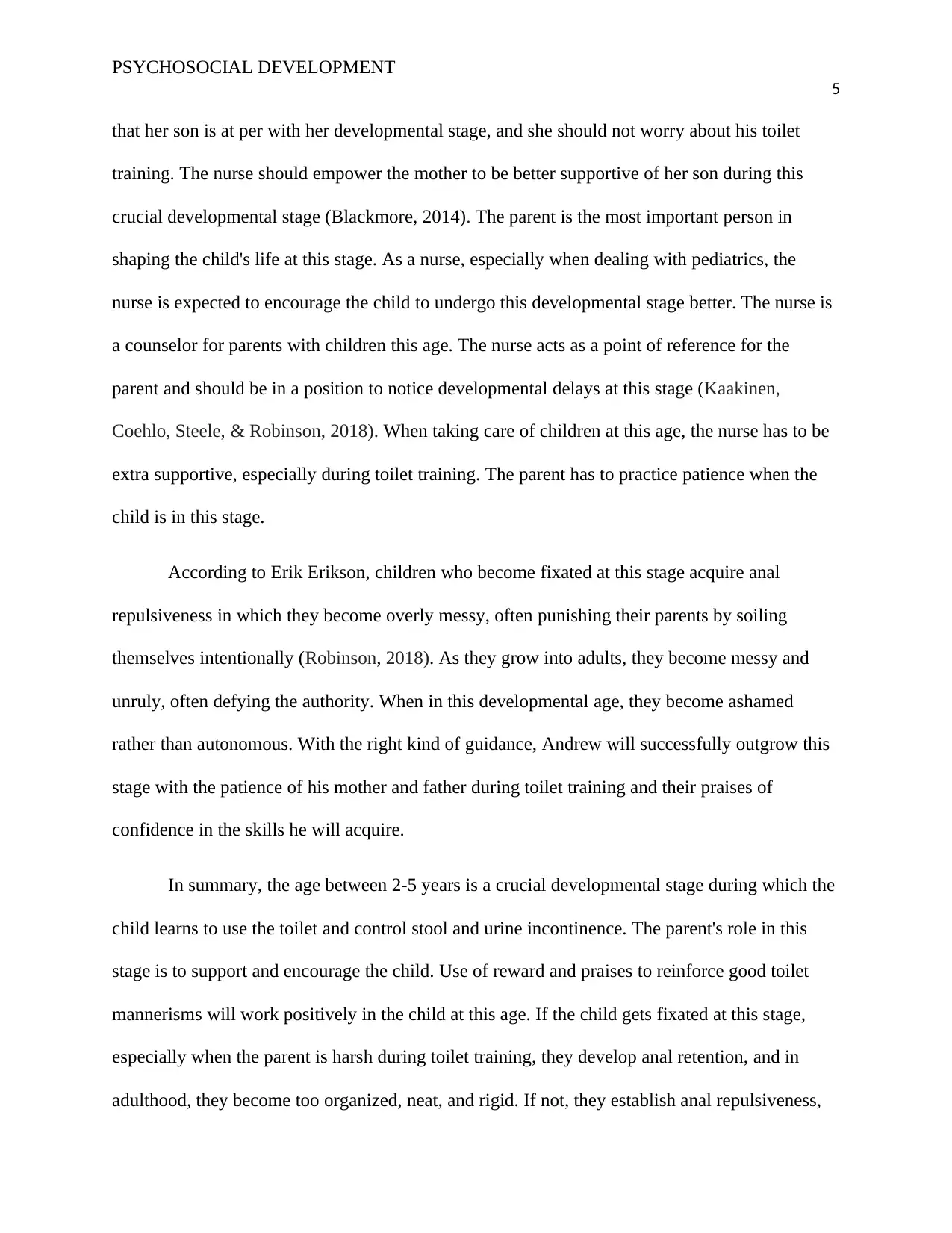
PSYCHOSOCIAL DEVELOPMENT
5
that her son is at per with her developmental stage, and she should not worry about his toilet
training. The nurse should empower the mother to be better supportive of her son during this
crucial developmental stage (Blackmore, 2014). The parent is the most important person in
shaping the child's life at this stage. As a nurse, especially when dealing with pediatrics, the
nurse is expected to encourage the child to undergo this developmental stage better. The nurse is
a counselor for parents with children this age. The nurse acts as a point of reference for the
parent and should be in a position to notice developmental delays at this stage (Kaakinen,
Coehlo, Steele, & Robinson, 2018). When taking care of children at this age, the nurse has to be
extra supportive, especially during toilet training. The parent has to practice patience when the
child is in this stage.
According to Erik Erikson, children who become fixated at this stage acquire anal
repulsiveness in which they become overly messy, often punishing their parents by soiling
themselves intentionally (Robinson, 2018). As they grow into adults, they become messy and
unruly, often defying the authority. When in this developmental age, they become ashamed
rather than autonomous. With the right kind of guidance, Andrew will successfully outgrow this
stage with the patience of his mother and father during toilet training and their praises of
confidence in the skills he will acquire.
In summary, the age between 2-5 years is a crucial developmental stage during which the
child learns to use the toilet and control stool and urine incontinence. The parent's role in this
stage is to support and encourage the child. Use of reward and praises to reinforce good toilet
mannerisms will work positively in the child at this age. If the child gets fixated at this stage,
especially when the parent is harsh during toilet training, they develop anal retention, and in
adulthood, they become too organized, neat, and rigid. If not, they establish anal repulsiveness,
5
that her son is at per with her developmental stage, and she should not worry about his toilet
training. The nurse should empower the mother to be better supportive of her son during this
crucial developmental stage (Blackmore, 2014). The parent is the most important person in
shaping the child's life at this stage. As a nurse, especially when dealing with pediatrics, the
nurse is expected to encourage the child to undergo this developmental stage better. The nurse is
a counselor for parents with children this age. The nurse acts as a point of reference for the
parent and should be in a position to notice developmental delays at this stage (Kaakinen,
Coehlo, Steele, & Robinson, 2018). When taking care of children at this age, the nurse has to be
extra supportive, especially during toilet training. The parent has to practice patience when the
child is in this stage.
According to Erik Erikson, children who become fixated at this stage acquire anal
repulsiveness in which they become overly messy, often punishing their parents by soiling
themselves intentionally (Robinson, 2018). As they grow into adults, they become messy and
unruly, often defying the authority. When in this developmental age, they become ashamed
rather than autonomous. With the right kind of guidance, Andrew will successfully outgrow this
stage with the patience of his mother and father during toilet training and their praises of
confidence in the skills he will acquire.
In summary, the age between 2-5 years is a crucial developmental stage during which the
child learns to use the toilet and control stool and urine incontinence. The parent's role in this
stage is to support and encourage the child. Use of reward and praises to reinforce good toilet
mannerisms will work positively in the child at this age. If the child gets fixated at this stage,
especially when the parent is harsh during toilet training, they develop anal retention, and in
adulthood, they become too organized, neat, and rigid. If not, they establish anal repulsiveness,

PSYCHOSOCIAL DEVELOPMENT
6
whereby they are messy and untidy. The nurse's role in this stage is to recognize, encourage, and
support the parent and child.
6
whereby they are messy and untidy. The nurse's role in this stage is to recognize, encourage, and
support the parent and child.
⊘ This is a preview!⊘
Do you want full access?
Subscribe today to unlock all pages.

Trusted by 1+ million students worldwide
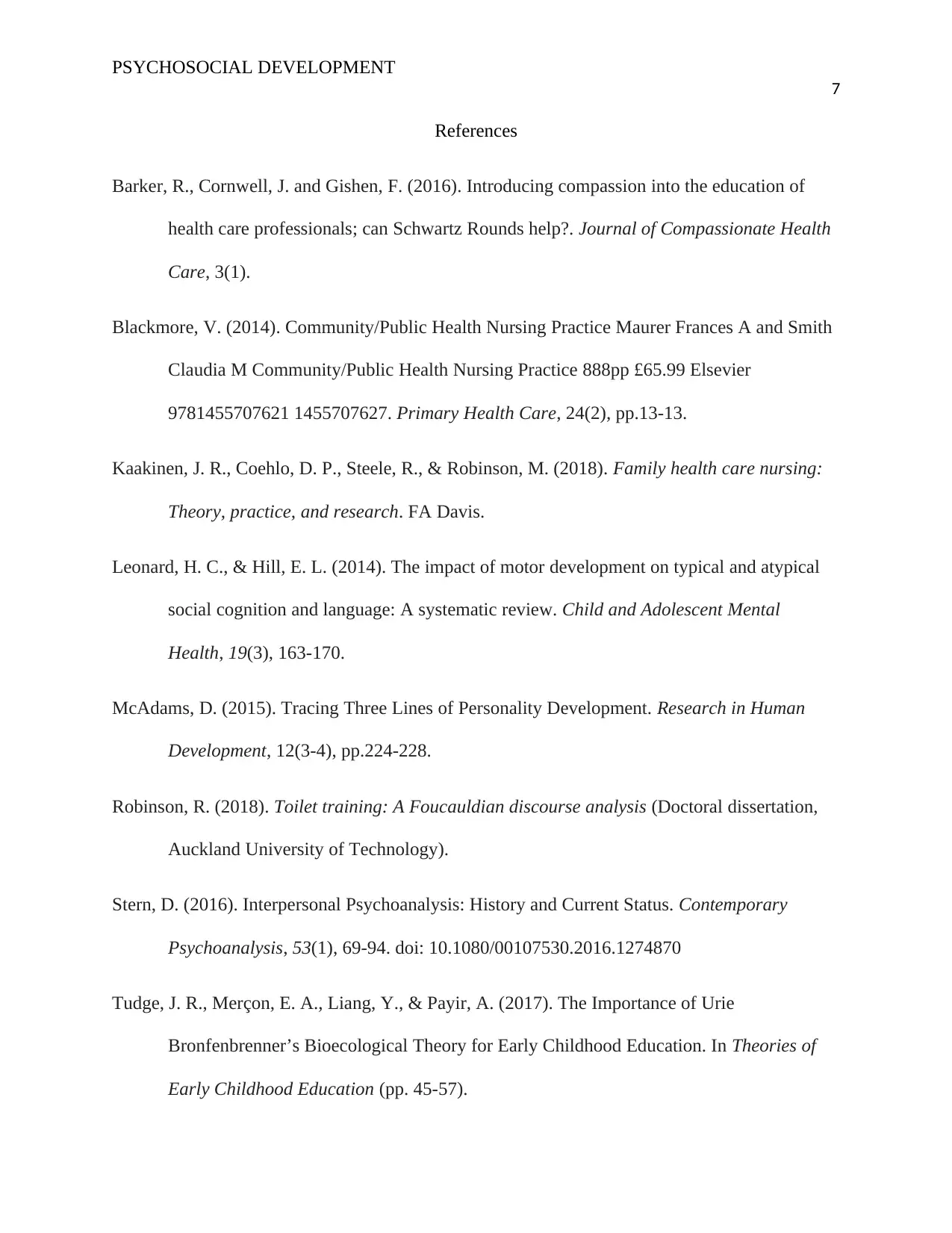
PSYCHOSOCIAL DEVELOPMENT
7
References
Barker, R., Cornwell, J. and Gishen, F. (2016). Introducing compassion into the education of
health care professionals; can Schwartz Rounds help?. Journal of Compassionate Health
Care, 3(1).
Blackmore, V. (2014). Community/Public Health Nursing Practice Maurer Frances A and Smith
Claudia M Community/Public Health Nursing Practice 888pp £65.99 Elsevier
9781455707621 1455707627. Primary Health Care, 24(2), pp.13-13.
Kaakinen, J. R., Coehlo, D. P., Steele, R., & Robinson, M. (2018). Family health care nursing:
Theory, practice, and research. FA Davis.
Leonard, H. C., & Hill, E. L. (2014). The impact of motor development on typical and atypical
social cognition and language: A systematic review. Child and Adolescent Mental
Health, 19(3), 163-170.
McAdams, D. (2015). Tracing Three Lines of Personality Development. Research in Human
Development, 12(3-4), pp.224-228.
Robinson, R. (2018). Toilet training: A Foucauldian discourse analysis (Doctoral dissertation,
Auckland University of Technology).
Stern, D. (2016). Interpersonal Psychoanalysis: History and Current Status. Contemporary
Psychoanalysis, 53(1), 69-94. doi: 10.1080/00107530.2016.1274870
Tudge, J. R., Merçon, E. A., Liang, Y., & Payir, A. (2017). The Importance of Urie
Bronfenbrenner’s Bioecological Theory for Early Childhood Education. In Theories of
Early Childhood Education (pp. 45-57).
7
References
Barker, R., Cornwell, J. and Gishen, F. (2016). Introducing compassion into the education of
health care professionals; can Schwartz Rounds help?. Journal of Compassionate Health
Care, 3(1).
Blackmore, V. (2014). Community/Public Health Nursing Practice Maurer Frances A and Smith
Claudia M Community/Public Health Nursing Practice 888pp £65.99 Elsevier
9781455707621 1455707627. Primary Health Care, 24(2), pp.13-13.
Kaakinen, J. R., Coehlo, D. P., Steele, R., & Robinson, M. (2018). Family health care nursing:
Theory, practice, and research. FA Davis.
Leonard, H. C., & Hill, E. L. (2014). The impact of motor development on typical and atypical
social cognition and language: A systematic review. Child and Adolescent Mental
Health, 19(3), 163-170.
McAdams, D. (2015). Tracing Three Lines of Personality Development. Research in Human
Development, 12(3-4), pp.224-228.
Robinson, R. (2018). Toilet training: A Foucauldian discourse analysis (Doctoral dissertation,
Auckland University of Technology).
Stern, D. (2016). Interpersonal Psychoanalysis: History and Current Status. Contemporary
Psychoanalysis, 53(1), 69-94. doi: 10.1080/00107530.2016.1274870
Tudge, J. R., Merçon, E. A., Liang, Y., & Payir, A. (2017). The Importance of Urie
Bronfenbrenner’s Bioecological Theory for Early Childhood Education. In Theories of
Early Childhood Education (pp. 45-57).
1 out of 7
Related Documents
Your All-in-One AI-Powered Toolkit for Academic Success.
+13062052269
info@desklib.com
Available 24*7 on WhatsApp / Email
![[object Object]](/_next/static/media/star-bottom.7253800d.svg)
Unlock your academic potential
Copyright © 2020–2025 A2Z Services. All Rights Reserved. Developed and managed by ZUCOL.





